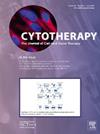Comprehensive analysis of secretome and transcriptome stability of Wharton jelly mesenchymal stromal cells during good manufacturing practice-compliant production
IF 3.7
3区 医学
Q2 BIOTECHNOLOGY & APPLIED MICROBIOLOGY
引用次数: 0
Abstract
Background
Mesenchymal stromal cells (MSCs) hold promise for cell-based therapies due to their ability to stimulate tissue repair and modulate immune responses. Umbilical cord-derived MSCs from Wharton jelly (WJ) offer advantages such as low immunogenicity and potent immune modulatory effects. However, ensuring consistent quality and safety throughout their manufacturing process remains critical. RNA sequencing (RNA-seq) emerges as a crucial tool for assessing genetic stability and expression dynamics in cell-based therapeutic products.
Methods
We examined the secretome and transcriptome of WJ-MSC signatures throughout Good Manufacturing Practice (GMP) production, focusing on the performance of total RNA or Massive Analysis of cDNA Ends (MACE) sequencing.
Results
Through extensive transcriptomic analysis, we demonstrated consistent stability of WJ-MSC expression signatures across different manufacturing stages. Notably, MACE-seq showed improved identification of key expression patterns related to senescence and immunomodulation.
Conclusions
These findings highlight the potential of MACE-seq as a quality assessment tool for WJ-MSC-based therapies, ensuring their efficacy and safety in clinical applications. Importantly, MACE-seq demonstrated its value in characterizing WJ-MSC-derived products, offering insights that traditional assays cannot provide.
在符合良好生产规范的生产过程中全面分析沃顿果冻间充质基质细胞的分泌组和转录组稳定性。
背景:间充质基质细胞(MSCs)具有刺激组织修复和调节免疫反应的能力,因此有望用于细胞疗法。来自沃顿果冻(WJ)的脐带间充质干细胞具有免疫原性低、免疫调节作用强等优点。然而,在整个生产过程中确保稳定的质量和安全性仍然至关重要。RNA测序(RNA-seq)是评估细胞治疗产品遗传稳定性和表达动态的重要工具:我们研究了WJ-间充质干细胞标志物在整个良好生产规范(GMP)生产过程中的分泌组和转录组,重点研究了总RNA或cDNA末端大规模分析(MACE)测序的性能:结果:通过广泛的转录组分析,我们证明了 WJ-MSC 表达特征在不同生产阶段的一致性稳定性。值得注意的是,MACE-seq 能更好地识别与衰老和免疫调节有关的关键表达模式:这些发现凸显了 MACE-seq 作为基于 WJ-MSC 疗法的质量评估工具的潜力,可确保其在临床应用中的有效性和安全性。重要的是,MACE-seq 证明了它在表征 WJ 间充质干细胞衍生产品方面的价值,提供了传统检测方法无法提供的见解。
本文章由计算机程序翻译,如有差异,请以英文原文为准。
求助全文
约1分钟内获得全文
求助全文
来源期刊

Cytotherapy
医学-生物工程与应用微生物
CiteScore
6.30
自引率
4.40%
发文量
683
审稿时长
49 days
期刊介绍:
The journal brings readers the latest developments in the fast moving field of cellular therapy in man. This includes cell therapy for cancer, immune disorders, inherited diseases, tissue repair and regenerative medicine. The journal covers the science, translational development and treatment with variety of cell types including hematopoietic stem cells, immune cells (dendritic cells, NK, cells, T cells, antigen presenting cells) mesenchymal stromal cells, adipose cells, nerve, muscle, vascular and endothelial cells, and induced pluripotential stem cells. We also welcome manuscripts on subcellular derivatives such as exosomes. A specific focus is on translational research that brings cell therapy to the clinic. Cytotherapy publishes original papers, reviews, position papers editorials, commentaries and letters to the editor. We welcome "Protocols in Cytotherapy" bringing standard operating procedure for production specific cell types for clinical use within the reach of the readership.
 求助内容:
求助内容: 应助结果提醒方式:
应助结果提醒方式:


